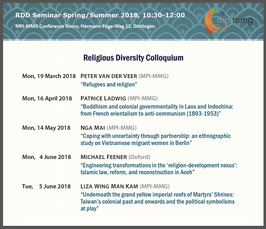"Engineering transformations in the ‘religion-development nexus’: Islamic law, reform, and reconstruction in Aceh"
Religious Diversity Colloquium Spring/Summer 2018
- Datum: 04.06.2018
- Uhrzeit: 10:30 - 12:00
- Vortragende(r): Michael Feener (Oxford)
- R. Michael Feener is the Sultan of Oman Fellow at the Oxford Centre for Islamic Studies, and Islamic Centre Lecturer in the History Faculty at the University of Oxford. He was formerly Research Leader of the Religion and Globalisation Research Cluster at the Asia Research Institute, and Associate Professor in the Department of History at the National University of Singapore. He has also taught at Reed College and the University of California, Riverside, and held visiting professor positions and research fellowships at Harvard, Kyoto University, École des Hautes Études en Sciences Sociales (Paris), the University of Copenhagen, The Doris Duke Foundation for Islamic Art (Honolulu), and the International Institute for Asian Studies (IIAS) in Leiden, the Netherlands. He has published extensively in the fields of Islamic studies and Southeast Asian history, as well as on post-disaster reconstruction, religion and development. His current research focuses on the archaeology and history of the Maldives.
- Ort: MPI-MMG, Hermann-Föge-Weg 12, Göttingen
- Raum: Conference Room

For more details please contact vdvoffice(at)mmg.mpg.de.
This lecture presents a critical examination of the workings of a contemporary Sharia system designed as an exercise in social engineering. It demonstrates the ways in which contemporary Muslim visions of instrumentalist, future-oriented models of Islamic law were formally implemented through the apparatus of the state as part of an overarching project of post-disaster and post-conflict reconstruction in Aceh, Indonesia. While many observers have characterized contemporary calls for the implementation of Islamic law as aiming at restoring a lost or imagined past, here the Sharia is envisioned not as a means for preserving established tradition, but rather as a tool in interventions for religiously-oriented social transformations. The religious engineering aspects of this project were, moreover, considerably amplified through resonance with a pervasive rhetoric of ‘total reconstruction’ as new discourses and institutional formations emerged out of engagements with global models of humanitarianism and development. These influences have contributed significantly to shaping the ways in which the architects and agents of the state Sharia system in Aceh have attempted to use Islamic legislation and governmental institutions as tools to steer society in particular desired directions that may be seen as alternative approaches to ethical and societal improvement within a highly-contested political landscape.